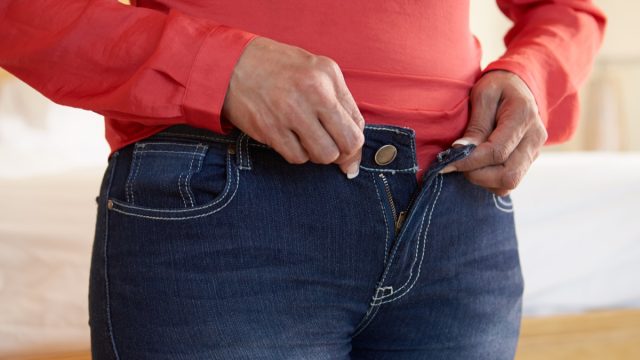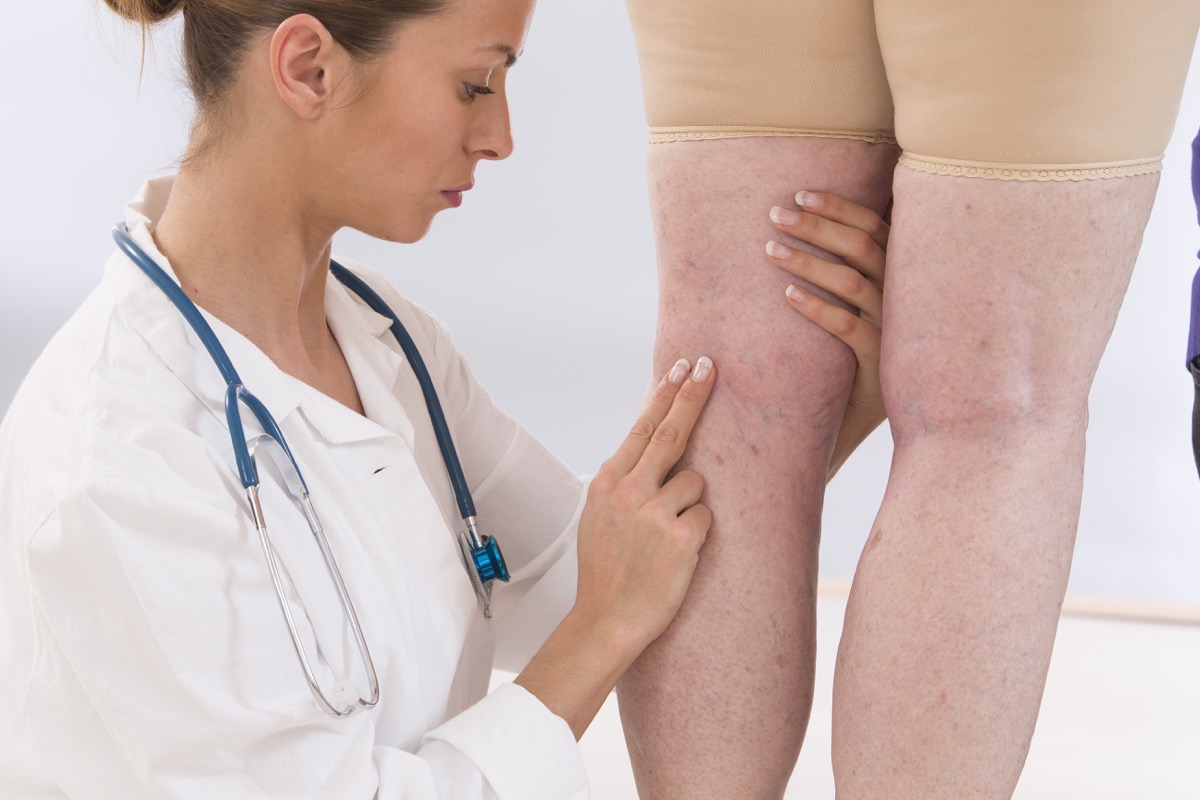11 Subtle Signs Your Rapid Weight Gain Is Something Serious

It isn’t that unusual to see a couple extra pounds on the scale from time to time. If you shy away from physical activity for a while, or eat a little more than you usually do, you’ll likely see the number on the scale go up. But while it’s easy to attribute weight gain to the usual culprits, that doesn’t mean that lack of exercise is always to blame. Sudden, unexplained weight gain can actually be a symptom of an underlying health concern. Here are some of the subtle signs your rapid weight gain could be something serious, according to experts.
1
You bruise easily and are experiencing muscle weakness.

You gained weight out of nowhere and are also suffering from pained muscles? The culprit could be Cushing’s syndrome, a disorder that occurs when your body makes too much of the hormone cortisol over a long period of time.
“Irregular menses, easy bruising, muscle weakness, and fatigue can be due to Cushing’s syndrome,” says Judi Goldstone, MD, a physician in internal medicine and weight loss expert. “Caused by excess cortisol, Cushing’s is associated with weight gain in the abdomen, neck, face, and back.”
This illness is hard to diagnose, according to the National Institute of Diabetes and Digestive and Kidney Diseases. Therefore, it’s best to head to the doctor sooner than later if you think Cushing’s syndrome might be behind your weight gain.
2
Your thyroid glands are swollen.

If your thyroid glands feel swollen, your skin feels dry, your heart rate is slow, and you are constantly tired—it might be time to consider hypothyroidism as the cause, according to WebMD.
Goldstone says other signs of hypothyroidism, or low levels of thyroid hormones, are poor concentration, confusion, or memory problems. While the effects are certainly not fun, it’s a condition that can be treated with medication, so it’s best to head to the doctor if you’re experiencing any of these symptoms.
3
Your have an irregular menstrual cycle.

If you are a woman experiencing infertility, irregular menstrual cycles, hair growth, or acne, you could be dealing with polycystic ovary syndrome (PCOS), says Goldstone.
Polycystic ovary syndrome is a hormonal condition that women can get during their childbearing years, and it can cause some to develop cysts on their ovaries, according to WebMD. An early diagnosis helps the treatment of PCOS, so get checked out ASAP.
4
You are coughing frequently and are having trouble lying flat.

“Loss of appetite, frequent coughing, or trouble lying flat are signs of heart failure, which can cause rapid weight gain in the abdomen, ankles, and legs due to fluid overload,” says Goldstone.
While the symptoms of heart failure differ, WebMD notes that it is incredibly important to see a doctor if you think you might be experiencing heart failure to receive the correct diagnosis and prompt treatment.
5
You are experiencing abdominal or lower back pain.

If your weight gain is accompanied by abdominal and lower back pain, pressure on the bladder, or constipation, these could be signs of uterine fibroids, according to Lynell Ross, certified health and wellness coach.
“Uterine fibroids are noncancerous growths that can grow large or decrease in size based on the blood flow to each fibroid,” she says. “It can cause weight gain due to bloating and a hormone imbalance or the size of the fibroid. Large fibroids can give the appearance of excess belly fat, also causing weight gain.”
6
You are experiencing mood swings, hopelessness, and sadness.

“Major depressive disorder is often correlated with weight gain,” says Christopher Drumm, a physician at Norristown Family Physicians. “I screen all patients with new weight gain with the PHQ-9,” which is used to diagnose depression.
Drumm says depression is tricky to diagnose because it can cause weight gain or weight loss, but he says that treatment helps improve those markers.
7
You recently started a new medication.

“Yes, medications we prescribe can cause weight gain,” says Drumm. “Certain diabetes medications including the sulfonylureas, insulin, and pioglitazone all cause some weight gain. It is interesting, since we encourage patients with diabetes to lose weight, yet some of the medications we give can make it harder to lose weight.”
Drumm adds that certain psychiatric medications can cause weight gain, with the atypical antipsychotics being the biggest culprit. Also, “oral steroids are the worst,” he says. “Do your best to avoid having to take them.”
8
You have stomach pains and swelling around your stomach.

It’s easy to rule out swelling around the stomach as weight gain. However, if you are experiencing abdominal pain and swelling, swelling in the legs and ankles, nausea, and vomiting, these could all be signs of liver disease, according to the Mayo Clinic.
Liver disease is a serious condition, and it’s important to contact your physician right away if you suspect you might have it. Some liver problems can be treated with lifestyle modifications, such as stopping alcohol use or losing weight, while others may need to be treated with medications or may require surgery.
9
You are swollen in the legs, arms, face, and eye sockets.

Swelling of the face, eye socket, legs, arms, hands, feet, abdomen, or other areas—as well as high blood pressure—are possible symptoms of nephritic syndrome, according to the Penn State Hershey Medical Center. “Patients retain fluid, which increases weight,” says Drumm.
Nephritic syndrome can be treated in a variety of ways, such as with a reduced-salt diet, bed rest, medication, or dialysis. You might also have to spend some time in the hospital, if your doctor finds it necessary.
10
Your joints are aching.

Weight gain accompanied by aching joints, a deeper voice, and skin tags could mean you have acromegaly, a hormonal condition that happens when the pituitary gland produces too much growth hormone, according to Medical News Today.
Acromegaly usually presents in mid-adulthood and can be treated with surgery or radiation therapy. Its primary symptom is the enlargement of feet and hands, so if you find that your shoes stopped fitting properly after gaining some weight, you might want to get checked out.
11
You have pain in your stomach and difficulty sleeping.

While weight loss is one of the most common symptoms of cancer, weight gain accompanied by pain in the abdomen or pelvis, difficulty sleeping, and irregular menstruation can be signs of ovarian cancer, according to Medical News Today.
Ovarian cancer can reach the later stages without detection, so it’s important to speak to a doctor if you are experiencing these symptoms. Its treatment largely depends on what stage your cancer is in, and might include surgery, radiotherapy, or chemotherapy, according to the Mayo Clinic.